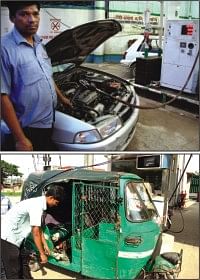Five years over, have you retested CNG cylinder?

Most of the fatal accidents take place at the filling stations.Photo: STAR
Thousands of CNG-powered vehicles operating with run-down cylinders pose serious threat of fatal accidents in the streets of Dhaka as the cylinders have not been retested even after expiry of the five-year average lifespan recommended by the experts.
These vehicles were converted into CNG-run in the first one or two years of introduction of compressed natural gas as an alternative energy around eight years ago.
“Most vehicle owners after conversion thought they can now enjoy the cheap environment-friendly fuel forever. But most of them are not aware that a cylinder requires retesting after five years for safety and other maintenance,” said Shafiul Azam, director (Operations), Rupantorito Prakritik Gas Company Ltd (RPGCL).
Country's first conversion workshop was established by RPGCL in 1998 as a model at Joarsahara in the city. In the beginning only government vehicles were converted. From the year 2001 private businesses were invited in the CNG conversion sector. Gradually private vehicle owners started showing interest in the cheap fuel.
Around 6,000 private vehicles were converted in the early period -- from 2001 to 2003. Cylinders of the vehicles already exceeding five years of operation need retesting and they belong to the most risky group, according to RPGCL.
Another vulnerable group consists of several thousand imported CNG run autorickshaws introduced in 2001, and taxicabs introduced in 1998 and the following years. These vehicles are also running without retest of their cylinders.
According to RPGCL, even some government vehicles converted more than five years ago require retesting of their cylinders.
“It has been more than 8 years since the first private vehicle was converted into CNG. Many of these vehicle are running with weak cylinders that requires retesting,” he added.
Azam said cylinder retesting is mandatory by law. A government notification issued on March 1, 2005 under The Explosive Act, 1884 introduced CNG Rules 2005. Under this rules it is mandatory to retest the cylinder after every five years.
Abu Sayed Md Khurshidul Alam, chief inspector at the Department of Explosives under the Ministry of Energy and Mineral Resources, explained why retesting is essential.
He said generally a natural gas vehicle (NGV) cylinder can be refilled around 14,000 times. Every time it goes through the refilling process the cylinder expands and after the gas runs out it shrinks again. This cycle continues during and after every refilling.
"After around 14,000 cycles of refilling the metal of the cylinder gradually weakens and its longevity period reduces. Therefore it is recommended that every cylinder has a tentative five-year expiration date and then it must be retested,” he said
"The NGV cylinder would not collapse or explode exactly after five years. However, if the cylinder is refilled for longer period it might become dangerous. The cylinder can collapse during refilling, which will be extremely fatal," he emphasised.
At the local filling stations average pressure of refilling is 3000 PSI (pounds per square inch) or 200 bar. "Actual withstand power of a CNG cylinder is usually higher than this. However, for a run-down cylinder even 200 bar pressure can be too much," Alam said.
"A retesting basically works as a precaution that should be taken to be on the safe side. Owners have become much aware these days. Still there are many private cars, taxicabs, private buses out there running with expired cylinders that requires retesting,” he added.
Compressed natural gas or CNG is comparatively a cheaper and environment-friendly fuel. It has become the most popular source of energy for vehicles in recent times due to the skyrocketing prices of liquid fuels.
Currently the official number of natural gas vehicles (NGV) in the country is around 1.5 lakh against the 6 lakh liquid fuel-run vehicles, according to RPGCL. Among the total, over one lakh vehicles are based in Dhaka.
Almost all of these CNG-run vehicles have been converted locally at various conversion centres with imported cylinders and kits. There are also a few imported original NGVs.
Around 4000 vehicles are being converted into NGVs annually.
Shafiul Azam of RPGCL however said the total number might be more than the official figure as many conversion centres do not report about how many vehicles they convert annually. As per law they are supposed to report to RPGCL.
Currently, the country has 125 government approved CNG conversion centres and over 200 CNG filling stations. Only 73 conversion centres regularly report to RPGCL.
“This causes another concern. If they do not report it becomes extremely difficult to trace all the CNG-run vehicles. Then how can we find old or faulty cylinders?” he said.
"Moreover, there are many unauthorised conversion centres increasing the risk even further as they often use locally manufactured substandard cylinders that was the source of many fatalities in the last couple of years,” he added.
Azam said only a handful of the CNG conversion centres have retesting facilities.
Sources at the Department of Explosives said the government has recently approved 10 private companies to open CNG cylinder retesting centres. Currently only three private companies -- Navana, Intraco and Southern Auto -- have such facilities while Sanji CNG conversion will open another retesting centre soon.
Md Sujon Mia, engineer at the retesting unit of Navana, said owners with NGVs are aware these days. Sujon informed that one retesting cost around Tk. 3000.
During the retesting process the cylinder is tested with the highest pressure it can possibly withstand. If it sustains any permanent deformation then it is declared faulty or fatigued and replacing the cylinder is suggested. Up to 5 percent deformation however is normal and is believed to be safe, he mentioned.
After a successful retesting the cylinder is again given a certificate and another tentative expiration date, based on its condition. Then it can run for a certain period of time.

 For all latest news, follow The Daily Star's Google News channel.
For all latest news, follow The Daily Star's Google News channel. 




Comments